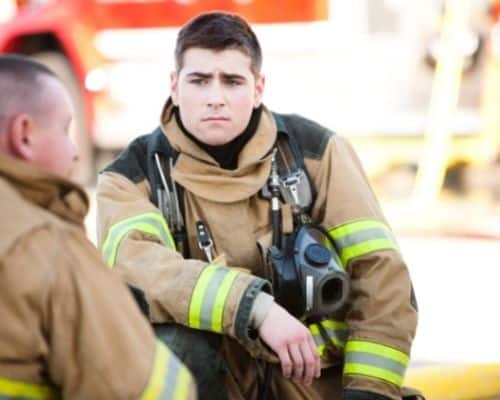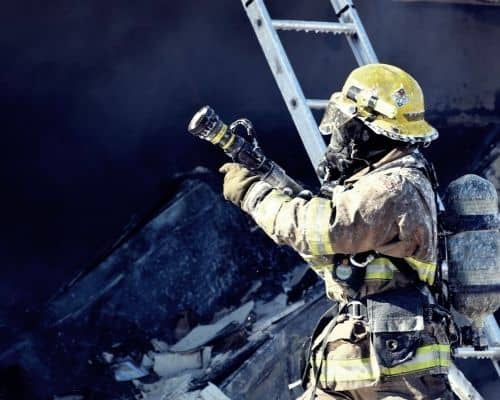According to IT and engineering job resource Apollo Technical, in 2020, 32 percent of those ages 25 to 44 years old have contemplated changing careers. Maybe you did more than just contemplate, but you decided to go forth and do it. In your 30s, 40s, or later, can you still become a firefighter or is there an age limit?
Yes, there is a lower and upper age limit for firefighting beginning at 18 years old. In some parts of the country, fire departments have a max hiring age for both paid and volunteer firefighters that might be around 35-40 years old or older.
In this article, we’ll examine the age ranges on the younger and older side of the spectrum for firefighters. By the time you’re done reading, you’ll know whether you can still pursue this career on a paid basis.
What’s the Youngest Age You Can Work as a Firefighter?
In the United States, the Fair Labor Standards Act or FLSA mandates the standards of youth employment. According to rules set forth by the FLSA, the youngest age that an individual in the country can be employed is 14.
However, at that age, they can only work a certain number of hours. By 16 years old, in many states, you can work a full-time job, which means you work at least 30 hours per week. Even with the freedom to work, you’re still a minor at age 16 in the US, not yet a legal adult.
That happens on a person’s 18th birthday. In some states such as Alabama and Nebraska, you’re considered a legal adult at age 19, and in Mississippi, it’s 21, but those states are the exception and not the rule.
The youngest age that fire departments will even consider your job application is 18 years old. If you live in a state where the legal adult age limit is higher, then you might have to wait until you’re a legal adult in that state to apply for firefighting work.

Other exceptions exist as well. For example, although you’re a legal adult in New York at age 18, you must be 21 years old before you can start work as a hired firefighter in the state.
Another exception is the National Junior Firefighter Program through the National Volunteer Fire Council or NVFC. The National Junior Firefighter Program was established in 2007 to train youths on what it takes to become a firefighter.
Since it’s a junior program, the participants are usually younger, such as 14 and up.
If you want to become a volunteer firefighter, some fire departments in the country might allow you to start volunteering as young as 16 years old. Both volunteering and joining a junior firefighting program are invaluable experiences to add to your resume.
Having prior firefighting experience–or at least firefighter training–might allow you to get a job as a firefighter as young as 18 or 21.
What’s the Oldest Age You Can Work as a Firefighter?
Now that we’ve talked about the lower limit for firefighting, we have to discuss the upper limit as well.
This is a trickier area. While the lower limit for firefighters varies only in some states, the upper limit is all over the map.
In many parts of the country, there is no upper limit. If you have the relevant experience and you’re 42 years old the day you send in your firefighting application, you could very well get the job. That’s true even if you’re 51.
In other states, there is a max age limit for firefighters, and it’s usually over 35 years old. That’s the case in Illinois as well as New Jersey, among others.
As the New Jersey state webpage above explains, you’re technically “over 35” on the day of your 35th birthday. If you’re 34 and a half, you could still apply for a firefighting job in a state with an upper age limit because you’re within that limit. You might not be for very much longer, but you are for now.
That New Jersey state webpage also brings up some interesting exceptions that might apply in the states with an upper age limit for firefighters. Let’s examine them now.
Military Background
Before you decided to change careers and become a firefighter, were you in the military? If so, then you’re in luck. The time that you spent committing to the military can often be subtracted from your birthday, which can buy you back years.
For example, let’s say you’re 35 years old and you served six years in the military. By taking away those years in the military from your age, you’re 29 years old. Sure, you’re not actually 29, but that’s the age that the state fire department would view you, at least in New Jersey.

Thus, while before, being 35 years old, you would have been ineligible to work as a firefighter, now that your adjusted age is 29, you can still apply to become a firefighter at your age.
Do keep in mind that not all military service counts under this provision.
Firefighting Experience
Let’s say that you didn’t just decide at the age of 35 to become a firefighter. You had prior experience, but you haven’t worked as a firefighter for several years.
In some states, this prior experience can be enough to get you the job even though you’re technically over the upper age limit. Illinois is one such state in which your job experience with other nearby fire departments can get you into another firefighting job at a different department.
The Illinois state webpage we linked you to above doesn’t get into specifics about what kind of experience you need, i.e., how many years, but the page does mention that you must have “credible full-time service.”
We’re interpreting that as you worked at the fire department full-time for a long period, likely years instead of months.
Can You Become a Firefighter in Your 40s or 50s?
You might wonder, why do some states enforce this upper age limit for firefighters? Isn’t that age discrimination?
In other fields, yes, it would be. In this one, not as much. The reason for the upper age limit is for your safety.
Being a firefighter, as we’re sure we don’t have to tell you, is physically and mentally grueling. You have an unpredictable lifestyle in which you can be called into work at any time. You have to handle heavy fire equipment, climb into burning buildings, use fire hoses, and rescue victims.
Can a 40-year-old do all these things? Certainly, yes. The more pertinent question though is this.
Can a 40-year-old handle the physical rigors of firefighting as well as a 20-year-old?
That answer is maybe.
A Jumpstart by WebMD article cites a 2005 study that reviewed the exercise capacity of people in different age groups. The study involved 800 participants, all men. They ran the age gamut from 21 to 87. The duration of the study was about eight years.
The participants would run on a treadmill once per four years. By tracking the participants’ VO2 max levels, which is how much oxygen the body needs when you’re exercising at your peak, the researchers noticed a trend.
“For example, aerobic capacity declined 3% to 6% each decade in the 20s and 30s, but after age 70 the rate of decline accelerated to more than 20% per decade,” says WebMD of the study.

The real kicker though is this. “The study also showed that after age 40, men’s fitness levels declined at a faster rate than women, regardless of their level of physical activity.”
As a 40-year-old or 50-year-old firefighter, you could train hard at the gym for hours every day to keep up with the 20-year-olds, but this study shows you two wouldn’t be on equal footing. The younger firefighter would still outperform you physically.
Not only does a younger firefighter have the physical advantage, but the mental one as well. A 2014 study that reviewed more than 3,300 people between the ages of 16 and 44 discovered that at 24 years old, your brain has the fastest response times.
Once you’re 25, even though you’re young, it’s all downhill from there.
In firefighting, instant reactions are critical. You need to be able to think fast and act fast, as that can often be the difference between life and death, either your life or someone else’s. If you can’t act when needed as a firefighter, then maybe this isn’t the right career field for you at this age.
Now you can see why some states employ upper age limits for firefighters. It’s in your best interest.
You must be at least 18 years old to be hired as a firefighter. The upper age limit might be 35 years old, but many fire departments across the country don’t have upper age limits. Even those that do might relax the rules if you have prior local firefighting experience or relevant military experience.
We hope the information in this article helped you plan your next career move. Good luck!